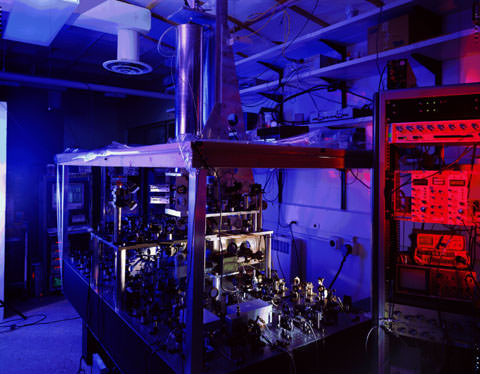[/caption]
Do you find that you’re always having to adjust the clocks in your house? Why can’t someone just make a clock that’s accurate? How about a clock that would never lose time in, say, the entire age of the Universe? Well, that’s just what researchers from the University of New South Wales are proposing.
According to their calculations, a neutron orbiting around the atomic nucleus of an atom would do the trick. In fact, this “atomic clock” would be so accurate, it wouldn’t gain or lose 1/20th of a second in 14 billion years – that’s the age of the Universe.
Obviously a clock like this wouldn’t have any value for home use, but in science, accurate clocks are everything. And this single atom clock would be 100 times more accurate than anything scientists have access to right now. They’d be able to record time down to 19 decimal places: 0.0000000000000000001 of a second.
One of the most important places that clocks are used is GPS. The Global Positioning System uses clocks to time how long signals take to reach your GPS unit from various satellites. The satellites are broadcasting very accurate times, which can then be used to triangulate your position. More accurate clocks mean more accurate position.
So how exactly would they do it? Lasers, of course. All the cool science is done with lasers. According the researchers:
“Atomic clocks use the orbiting electrons of an atom as the clock pendulum. But we have shown that by using lasers to orient the electrons in a very specific way, one can use the orbiting neutron of an atomic nucleus as the clock pendulum, making a so-called nuclear clock with unparalleled accuracy.”
Here’s the trick. The neutron of an atom is so tightly bound to the nucleus that it’s almost completely unaffected by outside forces. Electrons, on the other hand, can be affected and so the clocks can be less accurate.
Source: UNSW News Release


It is one thing for it to be accurate for the equivalent of the age of the universe, and another for such a clock to have been accurate since the dawn of the universe… if the dodgy observations of the varying fine-structure-constant, and other such things are to be believed.
Still, *very* cool story about something that will eventually be needed in our technological future.
I think GPS will be the real value here. Who knows what can get done with more accurate GPS systems.
Some people’s commonsense – see here and here – is in direct inverse proportion to the accuracy of the GPS systems they are using.
Where has common sense gone? Those clips are funny, but also sad.
It could be possible the Lense-Thirring effect could be measured with this clock. Frame dragging on signals propagated along the co-rotating and anti-co-rotating directions will result in a slight time delay. This is in addition to the geodetic shift or Sagnac effect. Maybe the phase different in the timing could be used in quantum encryption applications.
LC
In general relativity it is the same, as there is no independent time but what we observe from clocks. We pick the best clocks, and instead they inform us on things like the finestructure constant.
FWIW, there isn’t anything dodgy or varying about the finestructure constant, it is known to be exactly that within accuracy of precision measurements. People look for an extraordinary observation of drift, but no extraordinary or even ordinary evidence has ever surfaced. Mistaken claims yes, evidence no.
Super accurate clocks will also allow higher speed digital communications by reducing the jitter in the data stream. They will allow inteferometer telescopes to position on common targets better. Experiments in the LHC will gain greater accuracy. Many things benefit from more accurate clocks. I still think its amazing the Atomic clocks are so cheap now. You can by Rubidium standards for ~$40 these days!
a neutron orbiting around atomic nucleus???? how can it be?
It is a bit like an electron around an alkaline metal, such as sodium or cesium. In that case the electron is in an S shell somewhat independent of the other electrons. Nuclear structure has orbital shells, with duplicates for protons and neutrons. The clock works with a magnetic dipole interaction in the 7.6ev range of energy on a neutron in the nuclear shell structure.
LC
thanks, but i know that. The author should have said the neutron orbiting INSIDE the nucleus not AROUND it.
The paper may be accessed at
http://arxiv.org/pdf/1110.2490.pdf
this employs electromagnetic transitions in the nucleus.
LC
How is knowing exactly how late for work you are going to help? :S
Wait, so just to clarify – are they proposing we use the rotation of the nucleus as the clock? If so, won’t the charged protons in the nucleus be affected by outside forces, in turn affecting the neutron which is so tightly bound to that very same nucleus?
Or will the neutron actually sit outside the nucleus, orbiting it like the electrons?
I’m very confused.
HAU to the rescue using philosophy.
It becomes a question if such a neutron is part of a nucleus.
I think it’s actually electrons and neutrons that are affected, so, heavier, tighter, better. Proton is similar to neutron by being heavy, so I don’t think it’s a big problem.
Again, you can go philosophical about it. It doesn’t really matter as long as it works. You can have argumets for it to be outside or inside.
🙂